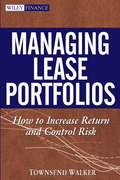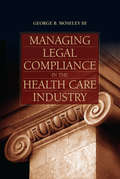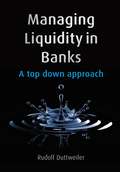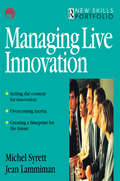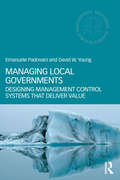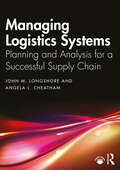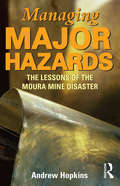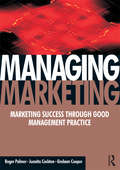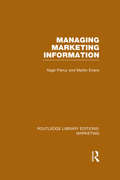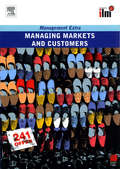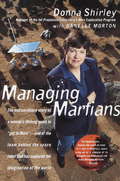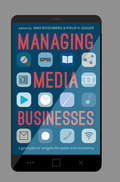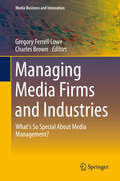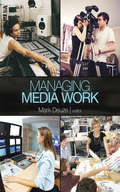- Table View
- List View
Managing Lease Portfolios
by Townsend WalkerLeasing is one of today's more complex forms of financing, and, unless you have extensive experience in this arena, making informed decisions can be difficult. Over the life of a lease, its risks and returns change, and the factors that affect the risks and returns also change.In Managing Lease Portfolios, Townsend Walker, an expert in this field, explains how to evaluate the risk of lease portfolios as well as hedge their long-term, non-traded risks. Here, you'll learn how to apply various financial tools to your portfolio of leases and discover the work that goes into each step--such as measuring the risks of a lease, calculating the returns, and estimating the effects of diversification. Many of the ideas and concepts found within this comprehensive resource have existed for a number of years in the fields of foreign exchange, interest rate and credit derivatives, and the bond and stock markets. This book adapts and applies these concepts to managing leases. Then it illustrates how you can implement these new concepts through concrete models that have been proven to work in the real world.
Managing Legal Compliance in the Health Care Industry
by George B. Moseley IIIManaging Legal Compliance in the Health Care Industry is a comprehensive text that prepares students for this increasingly critical field in health care administration. In three sections, this unique title first examines all the key laws and regulations that health care organizations must comply with. In section two, it explores in detail the seven essential ingredients for a good compliance program. In the final section, the book explains how the compliance program must be adapted to the special needs of different types of health care organizations. Designed for graduate level students in programs of public health, health administration, and law, the text is filled with highly practical information about the ways that legal violations occur and how good compliance programs function. Key Features: - Examines in detail the current laws and regulations with which all types of health care organizations must comply - Explore the seven essential ingredients for a good compliance program - Looks at compliance programs within twelve different types of health care organizations - References real world cases of fraud and abuse - Includes Study Questions and Learning Experiences in each chapter that are designed to encourage critical thinking
Managing Legal Uncertainty: Elite Lawyers in the New Deal
by Ronen ShamirWith the New Deal came a dramatic expansion of the American regulatory state. Threatening to undermine many of the traditional roles of the legal system and its actors by establishing a system of administrative law, the new emphasis on federal legislation as a form of social and economic planning ushered in an era of "legal uncertainty." In this study Ronen Shamir explores how elite corporate lawyers and the American Bar Association clashed with academic legal realists over the constitutionality of the New Deal's legislative program.Applying the insights of Weber and Bourdieu to the sociology of the legal profession, Shamir shows that elite members of the bar had a keen self-interest in blocking the expansion of administrative law. He dismisses as oversimplified the view that elite lawyers were "hired guns" who argued that New Deal legislation was unconstitutional solely because of their duty to represent their capitalist clients. Instead, Shamir suggests, their alignment with the capitalist class was an incidental result of their attempt to articulate their vision of the law as scientific, apolitical, and judicially oriented--and thereby to defend their own position within the law profession. The academic legal realists on the other side of the constitutional debates criticized the rigidity of the traditional judicial process and insisted that flexibility of interpretation and the uncertainty of legal outcomes was at the heart of the legal system. The author argues that many legal realists, encouraged by the experimental nature of the New Deal, seized an opportunity to improve on their marginal status within the legal profession by moving their discussions from academic circles to the national policy agenda.
Managing Legal and Ethical Principles Revised Edition
by ElearnStuck for ideas, inspiration or just want to work differently? Management Extra brings all the best management thinking together in one package. The books are practical and well structured to provide an in depth treatment of these management topics. Titles in the series: * Business Environment * Change Management * Development for High Performance * Effective Communications * Financial Management * Information and Knowledge Management * Leadership and Management in Organisations * Leading Teams * Making Sense of Data and Information * Managing Markets and Customers * Managing for Results * Managing Health, Safety and Working Environment * Managing Legal and Ethical Principles * Managing Yourself * Positive Working Relationships * Project Management * Quality and Operations Management * Reaching Your Goals Through Innovation * Recruitment and Selection * Reputation Management The series fuses key theories and concepts with applied activities to help managers examine how they work in practice. The books are created with individuals in mind. They are designed to help you improve your management skills. Management Extra can also be used in conjunction with management programmes of study aligned to standards. Each of the books has case studies, self assessments and activities all underpinned by knowledge and understanding of the frameworks and techniques required to improve performance. Management Extra provides managers and trainers with a handbook for action and development. "You found it – what a find! A practical resource packed with all the relevant theory and suggested activities to support your professional development. An essential resource to have at your fingertips, jump in and enjoy."--Russell Jeans, Learning and Development Manager, ntl "All the essential concepts are here, presented in an easily digestible format with lots of up to date case studies and references – but, most importantly, with plenty of thought provoking activities and self-diagnostic exercises to make the learning personal and transferable."--Peter Manning, Head of Training & Development, News International Newspapers Ltd
Managing Leisure
by Byron Grainger-JonesManaging Leisure is an excellent reference tool for both students and practitioners in the leisure industry.It provides detailed and practical advice on managing buildings, budgets and people. It also covers the vital aspects of law, finance, health & safety and competitive tendering. Managing Leisure takes management theory and looks at its practical application in a leisure management context.Ideal for students studying leisure management, this book will also appeal to practitioners in the field as a handy reference book.
Managing Liquidity in Banks: A Top Down Approach
by Rudolf Duttweiler"Liquidity risk is a topic growing immensely in importance in risk management. It has been much neglected by financial institutions and regulators in recent years and receives, in the course of the sub-prime crisis, sudden and great attention. This book is well-structured and provides a comprehensive and systematic approach to the topic. It will help risk controllers to systematically set up a liquidity risk framework in their bank." —Peter NEU, European Risk Team Leader, The Boston Consulting Group, and co author of Liquidity Risk Measurement and Management "Mr Duttweiler's book is a welcome addition to the literature on liquidity risk measurement and management. In addition to his contributions to liquidity risk theory and liquidity pricing, the author provides a good overview of all of the critical elements." —Leonard Matz, International Solution Manager, Liquidity Risk and co-author of Liquidity Risk Measurement and Management Liquidity Risk Management has gained importance over recent years and particularly in the last year, as major bank failures have led to a re-evaluation of the significance of liquidity in stressed market conditions. Liquidity risk is closely related to market risk and solvency, suggesting its significance in times of volatile and 'bear' markets, where a single bank's failure can have dramatic effects on market liquidity. The term liquidity is not well-define, and a comprehensive understanding of its common elements is often missing within a banking organisation. In too many cases, liquidity risk management has not been developed with a coherent framework and generally accepted terms and methods, creating weaknesses in its structure and vulnerability to market risk. In this title, Duttweiler advances the study of quantitative liquidity risk management with the concept of the 'Liquidity Balance Sheet', which allocates portfolios into a specific structure, and consequently is able to account for potentially negative surprises so that the necessary buffers can be quantified. The book begins with an overview of liquidity as part of financial policy and highlights the importance of liquidity as part of a general business concept and as protector and supporter of a business as a going concern. The author examines the role o liquidity in helping managers to achieve high-level liquidity aims to support operating units to achieve business goals. He looks at quantitative methods of assessing a banks liquidity levels, including LaR and VaR, to establish an integrated concept in which liquidity is incorporated into the framework of financial policies. He also presents methods, tools, scenarios and concepts to create a policy framework for liquidity and to support contingency planning.
Managing Live Innovation (Industrial Society New Skills Portfolio Ser.)
by Michel Syrett Jean LammimanManaging Live Innovation examines the innovation process from the line manager's perspective. This book identifies the skills needed to manage live 'real time' innovation in an environment where products and services are constantly refined, and where customer input is encouraged from an early stage. The New Skills Portfolio is a groundbreaking new series, published in association with the Industrial Society, which re-defines the core management skills managers and team leaders need to be competitive. Each title is action-focused blending 20th century management initiatives/trends with a new flexible skills portfolio for managers constantly experiencing and managing organizational and marketplace change.The Industrial Society is one of the largest public training providers in the UK. It has over 10,000 member organisations and promotes best practice through its publishing, consultancy, training and advisory serives. For more information contact their website on www.indsoc.co.uk.Jean Lammiman has successfully combined a career as a senior front-line manager specialising in the effective development of staff at all levels with groundbreaking work as an academic and consultant. Both authors run their own consultancy, The LSK Group, which designs and implements workshops, seminars and forums for senior management teams.Michel Syrett is an established business author, lecturer and consultant. For many years Editor of the Public Management and Management Education Pages at The Times, he contributes regularly to newspapers and journals covering business issues in Europe and Asia, including the Financial Times, Daily Telegraph, European, Management Today, Eurobusiness, Business Asia, Asian Business and South China Morning Post. He is also a Visiting Fellow at Roffey Park Management Institute and the Poon Kam Kai Institute of Management at the University of Hong Kong.
Managing Local Governments: Designing Management Control Systems that Deliver Value (Masters in Public Management)
by David W. Young Emanuele PadovaniLocal Government is an area where management skills are tested to the extreme. With political considerations evident both locally and nationally, managing resources can be complex and subject to change. This book introduces new concepts and new ways of doing business that can greatly enhance the value of the services a local government provides to its citizens, without putting a greater financial burden on taxpayers. Padovani and Young present out-of-the-box thinking based on solid research and experience to discuss topics such as: Incorporating outcome indicators into strategic planning and budgeting Building a LG’s budget with ‘cost drivers’ Expanding the concept of ‘enterprise funds’ Assessing and better managing the risk associated with outsourcing Using the concept of ‘shadow pricing’ to compare public with private sector costs for services This book is a must-read for students of public administration and management, senior and middle managers in local governments around the world, and citizens who are concerned with more effective management of their local government’s programs and services. A list of suggested extra case studies for each chapter, and a description of the process to follow for ordering them, may be obtained by sending an email to CrimsonCenter@cs.com. You should request the document "Case Study Suggestions for Managing Local Governments".
Managing Lock-In: How to Control Switching Costs
by Hal R. Varian Carl ShapiroThis chapter explores strategies for both buyers and sellers in terms of the lock-in cycle and the life cycle of a technology--where the costs of switching to newer technology can often lock a company into its current system or brand--and discusses when to leverage influential customers, sell complementary products and services, and exploit first mover advantage.
Managing Logistics Systems: Planning and Analysis for a Successful Supply Chain
by John M. Longshore Angela L. CheathamThis textbook introduces logistics from a broad perspective to include all activities throughout the product and service life cycle pertaining to supply chain and logistics management, the physical supply and distribution of products, and the corresponding maintenance and support. It recognizes the mutual interdependence of the major functional areas of the organization including marketing, production, and finance. The emphasis throughout the text is on logistics in the context of a total business system design process. It views the business as a "system", managing logistics within that system, and thus transforming their Supply Chain. Pedagogy to aid learning is incorporated throughout every chapter, with chapter objectives, case studies, and concept checks. This text is intended for both upper-level undergraduate and lower-level graduate students in both Business and Engineering on logistics and supply chain tracks. It can also serve as a reference for practitioners actively engaged in day-to-day management of logistics and supply chain activities. Supplementary online resources include an instructors’ manual, chapter-by-chapter PowerPoint slides, glossary, and a test bank of exam questions.
Managing Luxury Brands: A Complete Guide to Contemporary Luxury Brand Strategies
by Eleonora CattaneoLearn what makes a luxury brand, how to successfully market them in a changing global context and what opportunities sustainable luxury and the latest technological developments present.Managing Luxury Brands offers comprehensive coverage of key and cutting-edge topics in luxury brand management. Examining the socio-cultural contexts of luxury and the ways in which prestige brands create meaning, it presents a framework for understanding, analysing and developing a modern luxury brand. Unlike many other texts, it also explores the environmental and social impact of luxury, sustainable luxury and the opportunities of new technological innovations including the metaverse, artificial intelligence and non-fungible tokens (NFTs).With case studies and examples from a range of brands including Ferrari, Balenciaga and Shang Xia, Managing Luxury Brands brings together insights from leading academics in the field from across the globe who draw on extensive consulting and industry experience. Supported by a range of features which include learning objectives, discussion questions and chapter summaries, accompanying online resources consist of lecture slides and video interviews with industry experts. This textbook is an invaluable resource for any student studying luxury brand management.
Managing Major Accounts
by Frank V. CespedesWritten as an introduction to a module in the second-year MBA course, Marketing Implementation. Discusses issues encountered in the selling and management of major accounts. The topics covered include: 1) reasons for the increasing importance of major account management in sales management and marketing strategy, 2) a framework for account selection, 3) a review of concepts useful in analyzing buying behavior in major-account sales situations, 4) an overview of stages in the development of buyer-seller relationships, and 5) key issues in sales coordination.
Managing Major Hazards: The lessons of the Moura Mine disaster
by Andrew HopkinsMany organisations live with hazards that have the potential to cause disaster. This was the case at Moura underground coal mine in Central Queensland, where 11 men died in an explosion in 1994. Andrew Hopkins shows that the explosion was the result of organisational failure, and uses it to draw lessons about managing major hazards. He argues that there are always tell-tale signs of impending disaster, and that organisations need to find ways of gathering this information and reacting to it appropriately. The Moura story also demonstrates the need to move responsibility for risk management up the corporate hierarchy to ensure that it is not overshadowed by production pressures. Otherwise disasters will repeat themselves in horrifyingly similar ways. Managing Major Hazards is a gripping story and essential reading for occupational health and safety professionals, executives working in hazardous industries, policy makers, and readers interested in risk management and disaster studies.
Managing Major Sports Events: Theory and Practice
by Milena M. Parent Aurélia RuetschManaging Major Sports Events: Theory and Practice is a complete introduction to the principles and practical skills that underpin the running and hosting of major sports events, from initial bid to post-event legacy and sustainability. Now in a fully-revised and updated new edition, the book draws on the latest research from across multiple disciplines; explores real-world situations, and emphasises practical problem-solving skills. It covers every key area in the event management process, including: • Bidding, leadership, and planning • Marketing and human resource management • Venues and ceremonies • Communications and technology (including social media) • Functional area considerations (including sport, protocol, and event services) • Security and risk management • Games-time considerations • Event wrap-up and evaluation • Legacy and sustainability This revised edition includes expanded coverage of cutting-edge topics such as digital media, culture, human resources, the volunteer workforce, readiness, security, and managing Games-time. Each chapter combines theory, practical decision-making exercises and case studies of major sports events from around the world, helping students and practitioners alike to understand and prepare for the reality of executing major events on an international scale. Also new to this edition is an &‘Outlook, Trends and Innovations&’ section in each chapter, plus &‘tips&’ by leading events professionals. Managing Major Sports Events: Theory and Practice is an essential textbook for any course on sports event management or international sports management, and an invaluable resource for all sport management researchers, practitioners and policy-makers. Online resources include PowerPoint slides, multiple choice questions, essay questions and decision-making exercises.
Managing Major Sports Events: Theory and Practice
by Milena M. Parent Sharon Smith-SwanThe hosting of major sporting events can be a key tool in the development of cities and countries around the world. If carried out effectively these events can not only bring prestige to an area but can leave the local population with a legacy of improved infrastructure and facilities. Managing Major Sports Events: Theory and Practice is a complete introduction to the principles and practical skills that underpin the running and hosting of major sports events, from initial bid to post-event legacy. The book draws closely on the authors’ personal practical experiences of day-to-day management during the 2010 Winter Olympics in Vancouver, now widely regarded as the gold standard of Olympic organisation. Drawing on the latest research from across multiple disciplines, it covers every key area in the event management process, including: Bidding, leadership and planning Venue implementation Communications (e.g., media, marketing and sponsorship, technology) Functional area considerations (e.g., sport, protocol, security and risk management) Games-time considerations Ceremonies Legacy and sustainability. Each chapter contains a unique combination of theory, practical decision-making exercises and case studies of major sports events from around the world, helping students and practitioners alike to understand and prepare for the reality of executing major events on an international scale. A companion website includes self-test quizzes and flashcards for students, links to 110 useful websites, 173 summary slides, plus 45 essay questions and extended decision-making exercises for lecturers. Managing Major Sports Events: Theory and Practice is an essential textbook for any course on sports event management or international sports management and an invaluable resource for all sport management researchers and professionals.
Managing Manufacturing Knowledge in Europe in the Era of Industry 4.0 (Routledge Advances in Management and Business Studies)
by Justyna Patalas-MaliszewskaManufacturing companies need to adapt to the requirements of functioning in the era of Industry 4.0 and major technological disruptions. The use of knowledge-based decision support tools has also become necessary in order for enterprises to survive in a competitive environment. This book offers a new approach to designing the knowledge management process and integrating it with the implementation of Industry 4.0 technology. The book presents the methods used in a customer-oriented organization under the Management of Manufacturing Knowledge (M-Know Process). More specifically, methods for defining and collecting customer requirements are presented and methods on how to receive manufacturing knowledge, as well as how to formalise the acquired knowledge using key technologies of Industry 4.0, are discussed. The author also presents real case studies from western and central Europe and offers recommendations for the production manager. The instrumentation of methods and tools to support knowledge management, in the production of individualised products presented therein, will allow the manufacturing company to be transformed digitally, into a customer-oriented organisation operating in accordance with the assumptions of Industry 4.0. This book will be a valuable read for production researchers, academicians, PhD students and postgraduate level students of industrial engineering and industrial management. The practical case studies will also make the book a useful resource for managers of manufacturing enterprises.
Managing Market Relationships: Methodological and Empirical Insights
by Adam LindgreenSole reliance on traditional marketing practices can cost a lot of money for little gain. That's why establishing, developing, and maintaining market relationships with customers and other stakeholders is often hailed as an effective means to achieve a sustained competitive market advantage. Despite this, the benefits of relationship marketing remain uncertain, and efforts in this arena often fail. Managing Market Relationships explains what relationship marketing entails, how it is implemented, how it evolves, and how it is controlled. Building on research with colleagues, Adam Lindgreen argues that companies must add value - either through their products and services or through their relationships, networks, and interactions. Readers are introduced to the buyer-seller market exchange model that recognizes the importance of relationship marketing but argues that it should co-exist with traditional marketing. The book offers guidance on how to develop, involve, and evaluate management and employees in relationship-building market activities. To avoid the one-size-fits-all approach to relationships, that so often leads to the premature death of managers' efforts, a relationship management assessment tool is provided that helps companies to question, identify, and prioritize critical aspects of relationship marketing. This timely and comprehensively researched book is essential reading for researchers, those involved in the professional training and development of marketers, and higher level students and practitioners who will want to learn more about relationship marketing, relevant research methodologies and how to use sound managerial models and tools.
Managing Marketing
by Roger Palmer Juanita Cockton Graham CooperThe newly qualified manager may well be equipped with the skills of the “What” of marketing and management, but not know the “How.” The practicing marketer is well served with guides on strategy, mainly of the “four minute plan” variety, but poorly served in terms of basic advice on implementing the strategy and plans. This book is therefore designed to give clear guidance in managing the marketing function as a practical entity and allowing the new marketer to grasp how the theory can be applied to the job. Written by practitioners who are also active in the marketing education and training sectors it gives the reader a clear overview of-*How the key areas of marketing knowledge can be made operationally effective*How to make marketing practical and measurable*A huge range of examples and vignettes illustrating best practice*A truly international perspectiveThe book will be an invaluable toolkit for the newly qualified and newly appointed marketer trying to apply their knowledge of the theory
Managing Marketing Information (Routledge Library Editions: Marketing)
by Martin Evans Nigel PiercyA good marketing information system is an essential ingredient of all successful marketing. This book provides a comprehensive introduction to this key subject. This book not only covers market research techniques but also shows how research techniques should fit into a broader market information system which is skilfully and intelligently designed to suit the particular corporate context.
Managing Markets and Customers Revised Edition: Management Extra
by ElearnStuck for ideas, inspiration or just want to work differently? Management Extra brings all the best management thinking together in one package. The books are practical and well structured to provide an in depth treatment of these management topics. Titles in the series: * Business Environment * Change Management * Development for High Performance * Effective Communications * Financial Management * Information and Knowledge Management * Leadership and Management in Organisations * Leading Teams * Making Sense of Data and Information * Managing Markets and Customers * Managing for Results * Managing Health, Safety and Working Environment * Managing Legal and Ethical Principles * Managing Yourself * Positive Working Relationships * Project Management * Quality and Operations Management * Reaching Your Goals Through Innovation * Recruitment and Selection * Reputation Management The series fuses key theories and concepts with applied activities to help managers examine how they work in practice. The books are created with individuals in mind. They are designed to help you improve your management skills. Management Extra can also be used in conjunction with management programmes of study aligned to standards. Each of the books has case studies, self assessments and activities all underpinned by knowledge and understanding of the frameworks and techniques required to improve performance. Management Extra provides managers and trainers with a handbook for action and development. "You found it – what a find! A practical resource packed with all the relevant theory and suggested activities to support your professional development. An essential resource to have at your fingertips, jump in and enjoy."--Russell Jeans, Learning and Development Manager, ntl "All the essential concepts are here, presented in an easily digestible format with lots of up to date case studies and references – but, most importantly, with plenty of thought provoking activities and self-diagnostic exercises to make the learning personal and transferable."--Peter Manning, Head of Training & Development, News International Newspapers Ltd
Managing Martians
by Danelle Morton Donna ShirleyThe leader of the team that created the revolutionary Mars Sojourner rover chronicles her trailblazing career in space exploration and tells the fascinating, behind-the-scenes story of the celebrated Mars Pathfinder mission. Donna Shirley's 35-year career as an aerospace engineer reached a jubilant pinnacle in July 1997 when Sojourner--the solar-powered, self-guided, microwave-oven-sized rover--was seen exploring the Martian landscape in Pathfinder's spectacular images from the surface of the red planet. The event marked a milestone in space exploration--no vehicle had ever before roamed the surface of another planet. But for Donna Shirley, the manager of the Jet Propulsion Laboratory's Mars Exploration Program who headed the mostly male team that designed and built Sojourner, it marked a triumph of another kind. Since her childhood in Oklahoma, Shirley had dreamed of traveling to Mars, and, through Pathfinder, she did just that. Managing Martiansis Shirley's captivating memoir of a life and career spent reaching for the stars. From her seemingly outlandish aspiration at age ten to build aircraft, to abandoning high school Home Ec in favor of mechanical drawing, and, at sixteen, becoming a licensed pilot, Shirley defied expectations from the beginning. The only female engineering student in her college class, Shirley earned a degree in aerospace/mechanical engineering (while picking up a beauty contest title along the way) and, in 1966, began a career at the Jet Propulsion Laboratory that has spanned twenty-four different projects, including Mariner 10's trip to Venus and Mercury and a 1991 assignment as chief engineer of a $1. 6 billion project to explore asteroids, a comet, and Saturn. Shirley's innovations in automation and robotics paved the way to her being named the first woman ever to manage a NASA program. For Pathfinder she assembled a brilliant band of upstarts (her fellow "Martians") and embarked on an improbable mission: to put an untethered, fully automated rover on Mars--at a fraction of the cost of any previous Mars project. In a vivid narrative, rich with anecdotes and thrilling turning points, Shirley recounts the intense battles she waged to defend her vision and the ingenuity and resourcefulness of her committed team. Her moment-by-cliffhanging-moment account of Pathfinder's landing and Sojourner's first tentative foray across the sands of Mars brilliantly captures the fulfillment of a lifelong dream as it heralds a brave new era of space exploration.
Managing Media Businesses
by Mike Rosenberg Philip H. SeagerThis book is a practical guide to every aspect of managing media businesses. Written by a team of experts and illustrated with interviews from leading industry players, it addresses the unprecedented change and uncertainty facing the industry.Do newspapers, magazines or books have a future? Will terrestrial television or cable services exist as meaningful players in five years’ time? Is there a way to make multiple consumption platforms work together in a way that extracts the revenue needed to support the creation and development of quality content? While more and more content is being published, fewer and fewer businesses are finding a way to do so profitably and sustainably.Your answers to these questions that vex your media or entertainment business will depend on your frame – a frame based on experience gained in days that were less uncertain, less fluid and much, much simpler. Those frames need to be broken if you are to survive in times of such rapid change. This book is based on IESE’s Advanced Management Program in Media & Entertainment, which IESE Business School has been running in New York and Los Angeles since 2011. It combines contributions from leading professors and practitioners, as well as real-life case studies, to establish a base upon which you can start to build the set of managerial tools that you will need to manage fast-changing media and entertainment businesses.
Managing Media Firms and Industries
by Gregory Ferrell Lowe Charles BrownThis volume provides rich insight into the nature and practice of media management. Contributions assess the degree to which management of media firms requires a unique set of skills, highlighting similarities and differences of media firms compared with other industries in terms of management practices, HR development and operational aspects. Success and limitations of research on media management theory is evaluated, both drawing on management theory and examining insights from other disciplines. Dimensions for future research are considered along with practical implications for media managers and corporate structures. The book serves as a valuable reference for researchers, advanced students and practitioners in media industries.
Managing Media Work
by Mark DeuzeManaging Media Work provides a comprehensive, cross-national overview of the theory and practice of working in the media in the digital age. Focusing on three key areas—new media work, media professions, and media management—this text prepares students to effectively manage their own media careers and to manage human capital in creative companies. Written by leading international scholars, the book addresses the increasingly global, networked, and unpredictable nature of the media industry as well as the growing complexities of media work.
